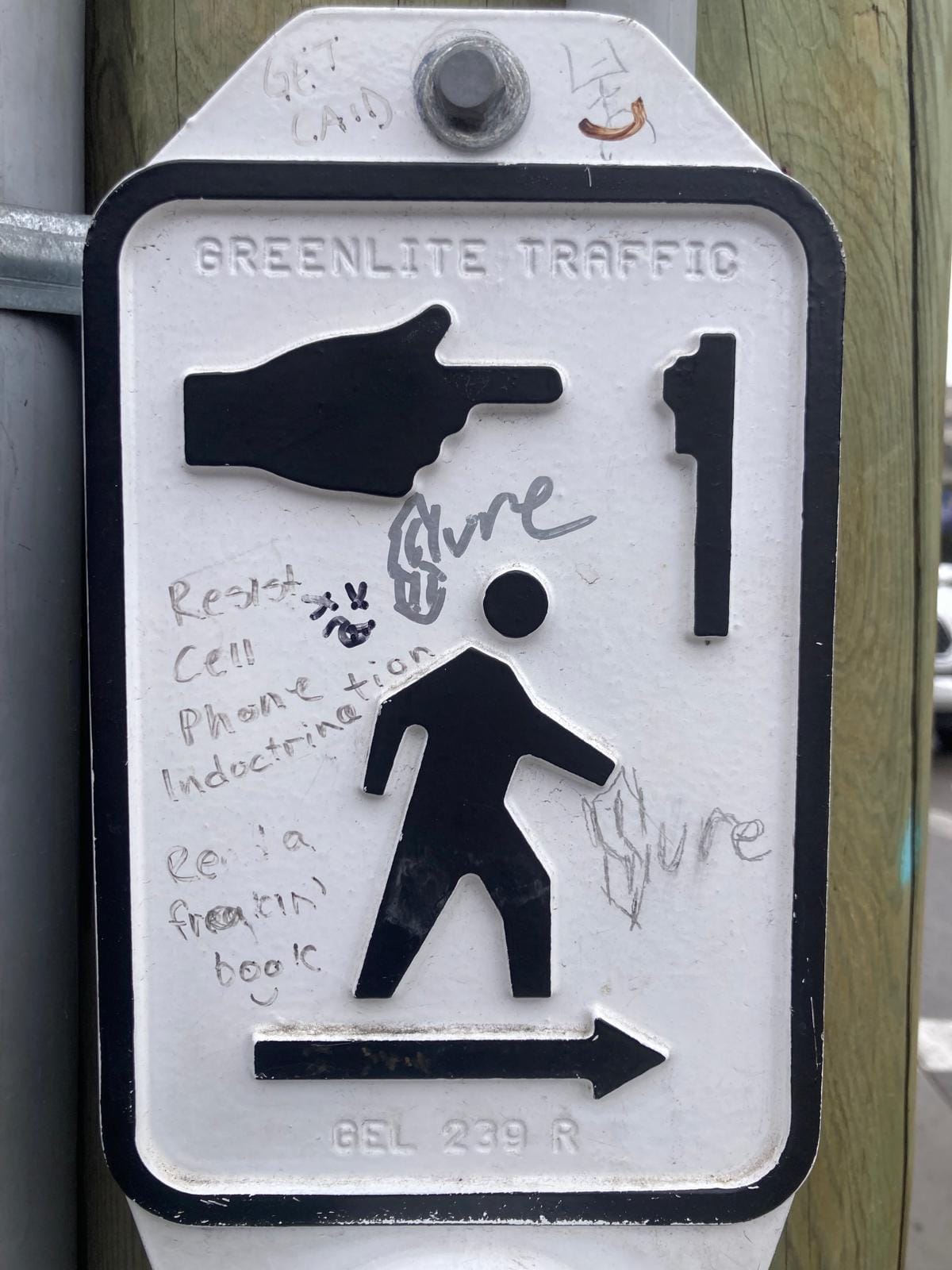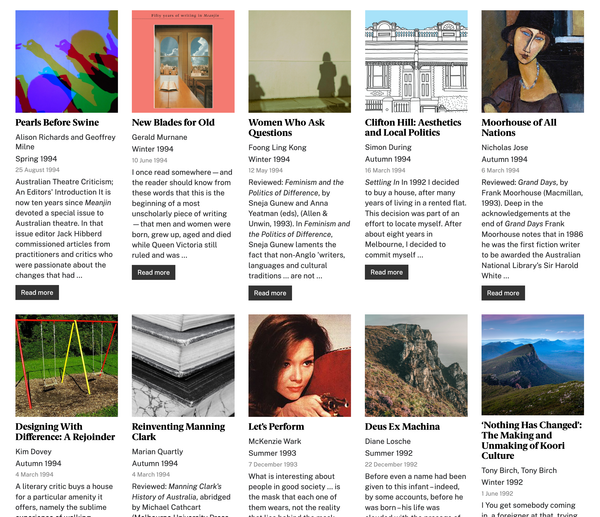Hiding in Plain Sight
On the shame of being online, covering your tracks, and yes, TAKEDOWN DISCOURSE

I am off Twitter and Instagram but I am definitely not offline and I am having to work a little harder on my defences against the increasing volume of slightly smug coverage of the benefits of flushing your phone and getting the hell off the internet altogether. I do remember, maybe ten years ago now, being told by a writer friend that she’d drawn a line under a romance that appeared to be budding after the first date. The fella knew her name, Googled her, found her work, read it, and had the temerity to ask her about it on Date 2. She experienced this as an unforgivable invasion of privacy, which surprised me, because, well, this was writing that was published under her name on the internet, shared on social media, hardly hidden away. Social sanctions might attach themselves to stalking – but not to the first page of a Google search, right? Part of my discomfort with this story was that I heard in it a rebuke for my own proclivity to, shall we say, Google around. I was a little ashamed. I came to the self-soothing conclusion that the failure of decorum lay not in Googling one’s prospective date, but in telling her about having done so.
I’ve been thinking a little about how digging into other people’s lives online is narrativised, and noticing the recurrence of tropes of self-concealment and shame. (It’s between you and your chosen deity whether you take digging as a euphemism for stalking or creeping, or as a synonym for research, or a good night in. It might also have something to do with your year of birth.)
First, two extracts from recent novels authored by millennial women.
I stalk a woman on the internet who is sleeping with the same man as I am. Sometimes when I am too quick to look at her stories, I block her temporarily so she doesn’t know I absent-mindedly refresh her page fifteen times a minute while Netflix plays in the background on my laptop, my stomach flipping sick with delight when her profile picture is ringed red. She has tens of thousands of followers, is verified, and is the daughter of someone famous in America. An endless stream of white people fawn in the comments under her posts.
This is the opening to Sheena Patel’s 2022 novel, I’m A Fan, a study of mediated and unmediated obsessions and attachments which involves a lot of subversive play with the conventions of digital self-presentation, especially insofar as they are racialised. A little later in this very short first chapter:
Sometimes I wonder if I ever met her, what would I say to her, would I tell her of our connection? Would I tell her I know where she lives, would I tell her how I guessed that she broke up with her boyfriend? Will I tell her I know why the tone of her stories changed because the man we are both sleeping with, the man I want to be with, shamed her for exploiting her privacy the last time they saw one another.
The sensations and reflexes registered here repeat across the novel: she’s ‘flipping sick with delight’, she’s covering her steps so that her private encounters with the public page of the other woman stay private, she’s refreshing the page ‘absent-mindedly’, she’s flipping between identification with the other and resentment. This is the relentless continuous present of the scroll, a state of embodied reflexivity in which words like ‘social’ and ‘connection’ become Moebius strips, all surface, all movement, and yet devoid of meaning. We might be in a crime novel, we might be in a cute millennial romcom written and published in the hope of being optioned. The set-up works because Patel knows that genre expectations will shape her reader’s encounter with the narrator. From the first clause, this is a confession – but it’s hardly unmediated. She’s an unreliable narrator who has been schooled in the inflections of candour and sincerity by Instagram captions and Facebook posts, the ones that keep getting edited for hours after being posted. I’m A Fan is actually a very smart novel that knows its readers are likely to have Googled their dates and creeped on the Instagram stories of their nemeses. The narrator is a highly paranoid social media user combing her feeds for clues and hidden messages (we find out why eventually); the quicker the reader of I’m A Fan follows her lead, doubts her authority, the quicker they will be able to catch up with the novel’s game.
Here’s another one:
If you’re wondering why I would search for Felix online when I already had a method of contacting him, I appreciate your purity. For one thing, I needed some outlet for my Felix-oriented energy that didn’t involve immediately revealing it to him. More to the point, the chance of discovering some uncontained fragment of Felix’s self that he’d left lying around on the internet was too exciting to sacrifice for some notion of respecting boundaries or Golden Ruling. Would I be mortified at the thought of a lover perusing my contributions to the college newspaper and Facebook photo albums of my time studying abroad? Yes. Of course. I’d swaddled my accounts in layers of gauzy privacy that offered an enticing amount of information to the idle google but limited any meaningful access to people I knew. Beyond these measures, though, there was, lurking on the third and fourth page of my search results, the unfortunate evidence that I had once been less judicious. My impulse to look Felix up was both greedy and calculating: I wanted to know everything about him and I thought I might be able to glean from his internet presence an effective way to approach him for a second date. I was also curious to see photos of his art.
Yes, it’s a paragraph from Lauren Oyler’s 2021 novel Fake Accounts! (And yes, we are in the company of the ‘Renata Adler of looking at your phone a lot’, of which more in a moment, probably more than required.) Patricia Lockwood’s No One Is Talking About This was published at the same time, and the two books, which differ substantially in their narrative mode, were greeted with enthusiasm as the harbingers of a bold new age of ⚡Internet Novels⚡. Olivia Sudjic’s Sympathy (2017), Olivia Laing’s Crudo (2018), Jenny Offill’s Weather (2020), Sally Rooney’s Conversations with Friends (2017): these books were heralded in a similarly hopeful manner, as internet novels, as signs that social media, instead of making a cultural irrelevance of the novel, might revivify it. This is obviously a heterogenous set of books – where Lockwood and Offill, for example, are minimalists, Oyler and Patel are talky maximalists. If I have a personal theory about the internet novel, it’s that it’s not a very useful classification, possibly even less useful than everyone’s favourite, literary fiction. Any contemporary novel set in the present that deals with, uh, technology, work, social life, memory, globalisation, travel, romance is an internet novel in one way or another.
Anyway, Fake Accounts is full of people pretending to be somebody else, especially online. No one is who they say they are! Don’t trust a dating profile! Oyler lays it on pretty thick, thematically, especially in paragraphs like the one above, which are riddled with signposts for the inattentive reader that say, I am a narrator with something to hide, don’t trust me! There’s nothing within the moral scheme of the novel that suggests this kind of duplicity is disreputable. It’s just part of the world that Oyler’s characters inhabit – and probably, if we’re honest, most of her readers do too.
Compare Patel and Oyler to this passage from the introduction to Naomi Klein’s Doppelganger, a work of non-fiction that takes as its point of departure Klein’s frustration with being mixed up with Naomi Wolf for decades. The themes of doubling and duplicity are reprised here, but Klein starts out, at least, with an idealism about people being who they say they are online that is absent from Fake Accounts and I’m A Fan. This is Klein in confessional mode as she accounts for her mounting obsession with Wolf, at the expense of time that could be devoted to family life, to activism, to Proper Research:
I engaged in all of this neglect so that I could… what? Check her serially suspended Twitter account? Study her appearances on Steve Bannon’s livestreams for insights into their electric chemistry? Read or listen to yet another of her warnings that basic health measures were actually a covert plot orchestrated by the Chinese Communist Party, Bill Gates, Anthony Fauci, and the World Economic Forum to sow mass death on such a scale it could only be the work of the devil himself?
My deepest shame rests with the unspeakable number of podcasts I mainlined, the sheer volume of hours lost that I will never get back. A master’s degree worth of hours. I told myself it was “research”.
If Naomi Wolf was busy on Instagram Stories, Naomi Klein would be checking them out, and feeling guilty about it. There’s a stagey incredulity here about just how much time Klein has spent down the wormhole. Klein dramatises here a classic older Gen X response (probably applies to Boomers too), I think, the response of an author conditioned to think that the real world happens offline, that not much of political or cultural significance happens online. I see this in peers my own age who have not been blessed with a career that involves working online, especially those who came late to the social media party, or not at all. One of the most interesting narrative arcs of the book tracks Klein’s reckoning with the stuff that does actually happen online, with the communities and relationships that form on social media platforms, with the reactionary politics that thrive online. I’m not persuaded by every beat of Klein’s arguments but the discourse around Doppelganger, for once, has been useful, particularly the long overdue debate about the consequences of the patronising attitudes of political strategists, researchers and activists to online communities. Where she starts, though, is by framing her time online in terms of waste, neglect and shame – something that Patel and Oyler’s narrators feel no need to do. Even though they are at pains to cover their tracks online, they’re online all the time and the duplicity of the writing self, the collapse of digital self-identity, is taken for granted.
‘I told myself it was “research”.’ In the past week there’s been a frenzy of bold pundits voicing the opinion that real research can’t take place online, it’s all ‘research’. Lauren Oyler’s debut collection No Judgment was released last month and most of the reviews have been hostile. I’ll get to writing about it myself eventually as I’m interested in the way this collection, and others like it, stage tensions between digital and print ideas about criticality and critical value. I detected a whiff of Wikipedia when I read the book, and Ann Manov, in her review for Bookforum, tracked the origin of several quotes used to anchor Oyler’s arguments to, yes, Wikipedia:
In her essay on Goodreads, Oyler offers a brief account of the history behind rating books out of five stars, all of which is—you guessed it—available on the Wikipedia page for “Star (classification),” which comes up when you Google “history behind rating books out of five stars.” First, Oyler discusses Regency Englishwoman Mariana Starke’s exclamation-point-filled guidebook to the Continent (and a quote from The Charterhouse of Parma mocking it, conveniently referenced on Ms. Starke’s Wikipedia page). Then, she makes a brief foray into the Michelin star (apparently less “whimsical” than exclamation points). And finally, she visits the Best American Short Stories series and its editor Edward O’Brien’s asterisks indicating “permanence.” Oyler includes extensive quotes from totally forgotten American satirist Oliver Herford’s nearly unreadable review trashing O’Brien’s selections for the 1921 BASS (a review conveniently referenced on the “Star (classification)” Wikipedia page).
Like Patel’s narrator, my stomach was flipping sick with delight when I first read this essay, which spread like the plague, because I too was underwhelmed by No Judgment, and appreciate a little drama. As is the case with a lot of viral pieces, the rush didn’t last and the self-righteousness of the shaming, the spectacularity of it all, left me a bit squeamish. And it is a spectacle, make no mistake, complete with social-media ready zingers. The triumphant responses to this usurpation of Oyler’s title as the Takedown Queen even reached me in my quiet retreat from Twitter (can’t call it X, sorry Elon). Oyler has fallen! The news is everywhere. Oyler made her name writing stinging reviews, here she is being given a taste of her own medicine. Never liked her! Over-rated! Receipts! Yadda yadda book deals! Will she post through it? The Wikipedia bit was hailed with loud cheers and screenshot quotes even on easy-going Bluesky, which is usually free of vigilantes.
Anyway, Lauren Oyler got a book deal (two!) for writing viral takedowns of women artists like Jia Tolentino and Greta Gerwig, perhaps Manov will get one too on the back of this piece. She’s already written a bunch of very negative reviews of more meritorious books than No Judgment, reviews in which her pretty obnoxious anti-feminist politics are expressed in unambiguous terms. No doubt when someone trashes her work, there will be a crowd ready to confirm that she too had it coming. To me, there’s something tremendously unsatisfactory about watching Manov indict Oyler for committing the sins for which Oyler indicted Tolentino, watching Manov rely on the same rhetorical moves that Oyler did to land her punches. At least when Oyler wrote about Tolentino, she gestured towards the larger context of the prestige personal essay and its circulation. In the Manov piece, there’s no context, no structure, no systemic questions that arise, such as how a book of underdeveloped essays made it to press, or why the quality of Oyler’s magazine pieces is so much higher than the work gathered in No Judgment. There’s a late gesture to the reception of Oyler’s reviews – ‘One wonders why her reviews, those diatribes against such easy targets, ever made such a splash’ – but little in the way of an answer.
In general, it’s negative reviews that go viral, especially if they’re studded with quotable burns. Twitter might be in its death-throes but this is its legacy. And while there’s substance to Manov’s critique (which mainly I think No Judgment deserves, FWIW), it’s the zingers that get traction, the Wikipedia gotcha that goes into circulation, the well actually that prefaces Manov’s zealous corrective account of the true history of vulnerability. This is showy stuff, great for the socials, but I’m not sure it’s a triumph for critical writing or thinking. For all the hoopla, it’s not very difficult to figure out whether someone used Wikipedia to write their essays. You just… Google it? It’s not a demonstration of advanced philological method. I saw a tweet that did the rounds describing the Manov piece as the Mortal Kombat of book reviews, to which I retort, who wants criticism to be a round of Mortal Kombat? What a facile, depressing vision of public intellectualism. If the liberal vision of the author as solo self-manifesting genius is up for revision (it should be) then the longform review should be able to do more than stage a showdown between critic and author. Choose your fighter? Bah.
I did pause to wonder though at what proportion of the witnesses to Oyler’s humiliation had also relied on Wikipedia at key points in their professional lives. Just like when my friend expressed outrage that her date had Googled her, my response was, who doesn’t do this? Who doesn’t use Wikipedia when they’re trying to get their head around a new subject? Yes, yes – go to the library, girl, there are books and magazines and peer-reviewed journals to read; do some reportage and fact-checking; do some Proper Research, not this crappy online ‘research’; insert a lecture on how to use Wikipedia as a starting point for research, not the endpoint – yes, all that. It is sloppy and egregious, for Oyler, a professional critic, to let herself get busted relying on Wikipedia in a printed book, of all things. Good catch Manov, shame on you, Lauren Oyler - but also, where were her editors, where were the fact-checkers, what were all the people reading the manuscript before publication doing? Oyler has her name on the cover, but the failure of No Judgment is surely in part institutional. The gleeful response to the Wikipedia gotcha had a moralising element, a sanctimoniousness, that strikes me as out of sync with the way actual humans use the internet, even if like Oyler and Patel’s narrators, like Klein, they feel a bit bad about it and try to cover their tracks. Enough discourse!
On less worldly matters: The eclipse this week was rained out in Vancouver. Not a tremendous surprise given it rains a lot here, especially in April. The school my kids attend took precautions and designated eclipse day an inside day, which means the kids had recess and lunch inside with the blinds pulled down. They were allowed to put on their outside shoes and raincoats and run around the playground in the afternoon. Eclipse musings were all over the legacy media and Substack through the week, and most of them were decidedly not cosmic reads. I expected to be wading through references to Annie Dillard’s great 1982 essay, Total Eclipse – but none surfaced (well at least not until I Googled, like an emblematic sloppy online researcher, and found it was featured here on LitHib). This is classic Dillard. The piece appears in Teaching A Stone to Talk and was anthologised in John D’Agata’s 2003 anthology The Next American Essay. I press it on people whenever I can. It’s a marvel of an essay, and if the paywall at The Atlantic prevents you from reading it at this link, then you can, if you dare, enter ‘Annie Dillard total eclipse pdf’ as a search term and do what you will with the results.
And finally, I reviewed Anna Jacobson’s debut memoir, How To Knit A Human, for Guardian Australia last week. It’s not a takedown! Here’s the link.
As I continue to insist in an ever more agitated manner, I am not on social media anymore, and therefore deprived of a platform from which to blow my own horn. Although this Oyler biz has left me mainly relieved that I’m no longer devoting large chunks of my attention to the Discourse, I’m unable to contribute to it. Irrelevance! A newsletter longer than even the most ostentatious Twitter thread! If you’ve made it this far and would like to share this newsletter with the socials, please do so, and with my thanks.
Thanks for reading Infra Dig! Subscribe for free to receive new posts and support my work.


